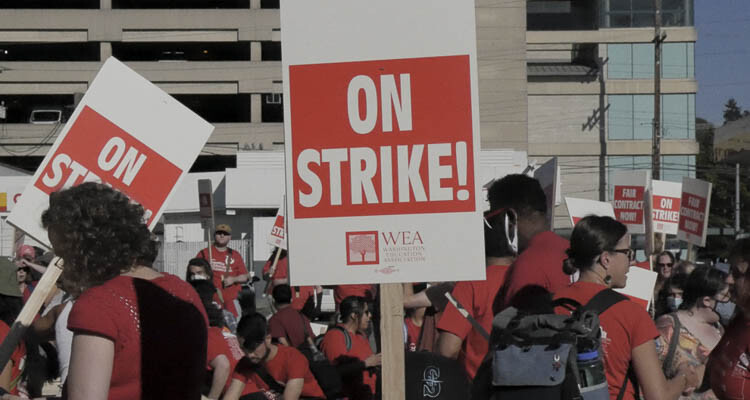
House Bill 1893 would remove the prohibition against receiving unemployment insurance benefits for workers taking part in a strike
Spencer Pauley
The Center Square Washington
The Washington House of Representatives has passed a bill that would allow workers in the state to receive unemployment insurance during strikes.
Currently, a worker is disqualified from receiving benefits if he or she is unemployed because of a labor action. House Bill 1893 would remove the prohibition against receiving unemployment insurance benefits for workers taking part in a strike.
The House approved a notable amendment to the bill to shift costs onto employers involved in labor disputes covered by HB 1893, instead of spreading the expense across the unemployment insurance system. This is a change from the underlying bill which would have had those benefits socialized across the unemployment insurance system.
Rep. Chris Corry, R-Yakima, noted that there is a 5.4% cap on the employment experience factor, so if there is a large strike with a lot of benefits paid out, the employer gets capped at the 5.4% mark.
“[This] inherently means that all the employers in the state are going to pick up the rest of the tab on the impact,” Corry said late Monday night during House floor debate.
According to the bill’s fiscal note, Washington could potentially see an increase this year in unemployment insurance claims from 812 to 3,000. That translates into an increase of $9.8 million to $14.1 million in annual payout of benefits that currently sit around $120 million a year.
The note also found that the state denied an average of 2,313 claims per year due to a labor dispute.
According to Cornell University’s Labor Action Tracker, thousands of workers went on strike in one of 26 labor actions in Washington in 2023.
During the floor debate, Rep. Suzanne Schmidt, R-Spokane Valley, argued that strikes are supposed to be what employees do as a last resort, because negotiations have stalled and this bill incentivizes employees to take advantage of the unemployment benefits.
“By paying employees unemployment during this time, it makes it an easier choice,” Schmidt said. “I fear that this is going to be something that becomes more usual and more often.”
Schmidt added that when workers go on strike, it slows down other industry sectors.
The House passed the bill by a 53-44 vote. The bill now goes to the Senate for consideration.
This report was first published by The Center Square Washington.
Also read:
- The Study of Sports Podcast, May 8, 2025: Girls flag football is coming to Washington high schools, but how do administrators start a new sport?Reporter Paul Valencia and sports administrators Tony Liberatore and Cale Piland discuss local sports first, and we have fun with other topics, too, including news about a famous burger restaurant coming to Vancouver
- Stephen Davis brings his message of unity with Turning Point USA presentation in VancouverStephen Davis of Turning Point USA visited Vancouver to share a message of unity and faith with students and families.
- Cardinals elect American pope to lead Catholic churchRobert Francis Prevost becomes the first American elected pope, taking the name Leo XIV following a fourth-round conclave vote.
- Camas Police arrest robbery suspectCamas Police arrested a 19-year-old Vancouver man following a reported armed robbery early Thursday morning.
- CCSO deputy involved in deadly force incidentA CCSO deputy reported fatally stabbing a DUI suspect during an altercation at the Ridgefield WSP Scale House.
- Opinion: Revolution or revival?Nancy Churchill argues that Washington state is ground zero for a Marxist-style revolution but says a cultural revival is possible through personal responsibility and the America First movement.
- WA governor pressed to veto $1.8B piece of Democrats’ tax billGrocers and restaurateurs are urging Gov. Ferguson to veto a surcharge in HB 2081 that they say will raise food prices statewide.











